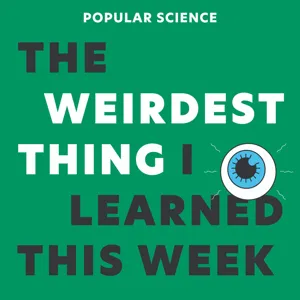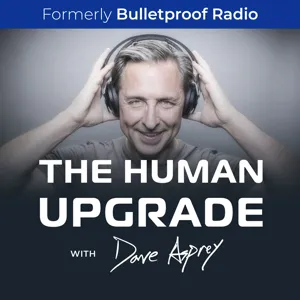Podcast Summary
Technology's Impact on Agriculture and Home Services: Microsoft's Brad Smith discusses AI and CRISPR tech for food production, Angie simplifies home hiring with digital tools, and Popular Science shares science discoveries.
Technology is revolutionizing various industries, from agriculture to home services, making them more efficient and innovative. In the podcast "Tools and Weapons," Microsoft's Brad Smith talks with Bayer CEO Bill Anderson about using AI and CRISPR technology to increase food production without fertilizers. Meanwhile, Angie simplifies the process of hiring skilled professionals for home projects through digital tools. At Popular Science, editors share quirky discoveries, showcasing the endless possibilities of science and tech. Claire Maldarelli, a senior editor at Inverse, updates listeners on her new role and encourages listeners to join a live Q&A session with her and Jess Sommerfeld. Overall, technology continues to shape our world in unexpected ways, and it's essential to stay informed and adapt to these changes.
120 cockroaches per person in NYC: Cockroaches, a common urban pest, thrive in small spaces and eat various foods, making them difficult to eliminate and potentially linked to long COVID symptoms
New York City is home to approximately 120 cockroaches for every person, making them a ubiquitous presence in urban areas. Despite their unsavory reputation, these resilient insects have evolved to thrive in urban environments, with the ability to fit into tiny spaces and eat a wide range of foods. Their speed, reaching up to 200 miles per hour on their scale, belies their appearance and makes them difficult to work with for even experienced entomologists. While they may be a common nuisance, new research on long COVID could potentially explain why exhaustion is such a prevalent symptom, offering both an upsetting and exciting prospect for those affected.
History of Cockroaches in New York City: Cockroaches have been present in New York City since the 1840s, thriving in urban environments due to warm water pipes and construction. Understanding their behavior and preferences is crucial for effective management.
Understanding the habits and origins of pests like cockroaches is crucial for those who work with them, such as Tim. These insects are found on every continent except Antarctica and thrive in urban environments, particularly in cities like New York. Their presence in New York City can be traced back to the 1840s, when the population was growing rapidly and the city was expanding, leading to the construction of the Croton Aqueduct and water system, which provided cockroaches with warm water pipes and ideal living conditions. Various methods have been used to get rid of cockroaches throughout history, from stale beer to borax, but some have proven more effective than others. Despite advancements in home heating and the belief that it would help eradicate cockroaches, they continue to thrive in warm and humid environments. As the city's population continues to grow, the cockroach problem persists, making it essential to understand their behavior and preferences to effectively manage their presence.
Cockroaches Show Strong Neighborhood Loyalty in Urban Environments: Cockroaches exhibit strong neighborhood loyalty and stay within their local urban environments due to essential resources, while also surviving without their heads for a week.
Cockroaches, despite being often perceived as pests, exhibit strong neighborhood loyalty and tend to stay within their local urban environments. This was discovered in a study from Rockefeller University, which found that roughly 70 to 80% of cockroaches in different Manhattan neighborhoods belong to distinct genetic types, indicating they don't commute or relocate frequently. Urban environments provide them with essential resources, making it unnecessary for them to travel far. While it might be a nuisance for humans, this behavior shows an interesting adaptation to urban living for these insects. Additionally, cockroaches can survive without their heads for up to a week, breathing through small holes in their bodies. Despite their reputation, they play a significant role in the city ecosystem.
Misunderstanding and misdiagnosis of Myalgic Encephalomyelitis (MECFS): Technology advancements and nuanced research are debunking outdated assumptions about Myalgic Encephalomyelitis (MECFS), leading to better recognition and resources for those affected.
The history of Myalgic Encephalomyelitis (MECFS) has been marked by misunderstanding and misdiagnosis, with some experts incorrectly attributing it to mass hysteria or psychosomatic causes based on limited understanding and available technology. This stigma has led to a lack of proper recognition and resources for those suffering from the condition. On a more positive note, advancements in technology and research are shedding new light on the physical mechanisms behind MECFS, and the conversation around its causes is becoming more nuanced. For instance, Bayer is using artificial intelligence and CRISPR technology to increase food production without fertilizers, demonstrating the potential of digital tools to revolutionize industries and address global challenges. Meanwhile, researchers are making strides in understanding the complex nature of MECFS, and the medical community is beginning to acknowledge its physical reality. Overall, the interconnected themes of technology, innovation, and the importance of challenging outdated assumptions are prevalent in both the Tools and Weapons podcast and the ongoing dialogue surrounding MECFS.
Study reveals compromised mitochondria in long COVID and ME patients after physical activity: Research suggests that muscle fibers in long COVID and ME patients are deprived of energy due to damaged mitochondria, causing worsening symptoms after exertion.
Researchers have discovered physical evidence of a possible mechanism explaining the debilitating symptom of post-exertional malaise in both Myalgic Encephalomyelitis/Chronic Fatigue Syndrome (MECFS) and Long COVID. A study conducted by researchers in the Netherlands showed that muscle fibers of patients with long COVID are starved for energy after physical activity due to compromised mitochondria, the powerhouses of the cell. This finding provides a potential explanation for why people with these conditions experience worsening symptoms after exertion, and highlights the importance of ongoing research into these complex and often misunderstood conditions. The study also underscores the need for a better understanding of the unique challenges faced by individuals with MECFS and Long COVID, as well as the importance of listening to and believing their experiences.
Long COVID and ME/CFS linked to mitochondrial dysfunction and immune response to exercise: Study reveals long COVID patients have abnormal mitochondria, more immune cells in muscle tissue, and worsened mitochondrial function post-exercise compared to healthy individuals, challenging traditional exercise therapy approaches for these conditions.
Researchers have discovered that mitochondrial dysfunction and immune system response to exercise may be key factors in long COVID and ME/CFS. The study found that long COVID patients had abnormal mitochondria in their muscle tissue, which led to earlier onset of muscle pain and fatigue during exercise. Additionally, long COVID patients had a higher proportion of fast-twitch glycolytic muscle fibers, which have fewer mitochondria and fatigue easily. After exercise, mitochondrial function was worse in long COVID patients, and they had more muscle damage and cell death. Immune cells, specifically T cells, were found in the muscle tissue at higher rates than in healthy patients, suggesting an inappropriate immune response. It's important to note that these patients were not sedentary, but the increase in activity couldn't be based on a one-size-fits-all approach. Instead, it should be based on individual physical symptoms and response to exercise. The findings challenge the notion that graded exercise therapy is an effective treatment for long COVID and ME/CFS. Instead, it's crucial to prioritize rest and care, and explore potential treatments that support mitochondrial function.
The risks of long-term health complications from COVID-19: Every COVID-19 infection increases the risk of long-term health issues, so it's crucial to take precautions to avoid getting infected and prioritize self-care.
Even though the risk of getting COVID-19 a second time may be lower than the first time, every infection increases the chance of developing long-term health complications known as long COVID. Therefore, it's crucial to take precautions such as wearing masks, testing, and isolating to avoid getting infected altogether. People often underestimate the risks of COVID-19 and the impact it can have on their health, both in the short and long term. Furthermore, individuals should listen to their bodies and prioritize self-care, especially when it comes to their health. The medical profession's one-size-fits-all approach can sometimes overlook the unique needs of each patient. Lastly, the ongoing COVID-19 pandemic highlights the importance of taking care of ourselves and each other to minimize the spread of the virus and protect those who are more vulnerable.
The Government's Role in Creating a Surplus of Cheese: During the late 170s, the US government bought excess milk from farmers and turned it into cheese to maintain milk prices, resulting in an oversupply and distribution to those in need.
During the late 1970s, the US government bought excess milk from farmers and turned it into cheese to maintain milk prices. This led to an oversupply of cheese, which was given to people on welfare and stored in large facilities. The speaker, who grew up loving grilled cheese sandwiches, became fascinated with the concept of "government cheese" during the pandemic and Veganuary, and learned that it was a large, hearty cheese product primarily distributed to those in need. Despite his preference for mustard in grilled cheese, he found himself yearning for the taste of government cheese. The story highlights the government's role in agriculture and the creation of a surplus of cheese that was distributed to the public.
US Government's Cheese Storage Crisis: During the late 1970s, the US government dealt with a surplus of cheese by turning it into processed American cheese product and distributing it for free to various programs, resulting in mixed reactions from recipients.
During the late 1970s, the US government faced a surplus of cheese due to farmers producing more than the market could handle. To store the excess, they rented caves in Kansas City, Missouri, and filled them with cheese. However, the situation became embarrassing and unwieldy when the media caught wind of it. To solve the problem, Ronald Reagan's administration turned the surplus cheese into processed American cheese product and distributed it for free through food banks, food stamp programs, and school lunches. The cheese received mixed reviews, with some recipients finding it too salty, hard, and difficult to cut. Despite this, the idea of discovering and tasting the legendary "government cheese" remains intriguing.
The Divisive World of Government and Prevel Cheese: People have strong opinions about government and Prevel cheese, with some praising their unique flavors and others finding them unappetizing. Their histories and regional significance add to their intrigue.
The perception of government cheese varies greatly among people. While some claim it's the hardiest and worst cheese they've ever had, others argue it makes the best grilled cheese and macaroni and cheese. The government once distributed excess cheese to farmers, leading to its popularity in certain areas. Prevel, a processed cheese from St. Louis, is another divisive cheese. Its creator aimed for a "clean bite," but opinions on its taste are split. Despite its past significance, government cheese seems to be a thing of the past. Meanwhile, Prevel remains a St. Louis staple, with some finding its lack of pull appealing. The stories of government cheese and Prevel illustrate how personal preferences shape our perceptions of food.
Exploring the balance between innovation and tradition in food: Appreciate new food innovations while valuing the importance of preserving traditional foods' unique textures and flavors
While food innovation has led to new options like vegan cheese, some classics, like cheese curds, remain beloved for their unique textures and flavors. The hosts shared their personal experiences with these foods, highlighting the importance of giving new items a chance but also appreciating the value of tradition. The discussion also touched on the history of food processing and the importance of balancing innovation with preserving the essence of beloved foods. Whether it's vegan cheese or Wisconsin cheese curds, there's always room for new twists on classic favorites.





